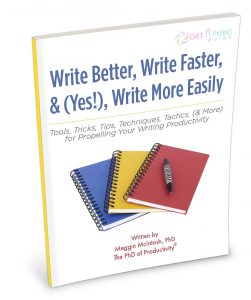Tricks for Writing Productively by Meggin McIntosh, PhD
 Although there are times that you can just sit right down and write and you don’t need any tricks, other times…let’s tell the truth, we need at least one trick – and sometimes several tricks – to get us going. Here are my top ten tricks, which I have used in myriad ways over the years.
Although there are times that you can just sit right down and write and you don’t need any tricks, other times…let’s tell the truth, we need at least one trick – and sometimes several tricks – to get us going. Here are my top ten tricks, which I have used in myriad ways over the years.
-
Write a question that begs for an answer. You can write questions you have or questions others have asked you. You need only to generate one question, but having a list of questions to draw from related to your writing topics is even better.
-
Break your writing projects into small parts. As the saying goes, when you have to eat an elephant, eat it one bite at a time. The same is true for writing. If you envision your writing as this monstrous beast, then you are likely to avoid contact with it. If you break your writing into small parts – sometimes REALLY tiny pieces – then you feel much more like working on your writing.
-
When you come to a word or sentence that stymies you, move on. One of the best tricks you can use when you’re flowing along in your writing is to KEEP FLOWING. Don’t let one word, phrase, or thought be the speed bump that slows you down. Put in a placeholder like an asterisk and come back to it later.
-
Ask others to answer a question. Regardless of what subject you are writing about or what type of writing you are doing, you can always ask others a question about some aspect of your topic.
-
Write early or write late. One is not better than the other, but one is likely to be preferable for you. Figure that out, then target and protect that time for your writing.
-
Schedule writing time like an appointment. When you have a hair appointment, an eye doctor’s appointment, or an appointment for a meeting with your child’s teacher, you show up. If you consider your writing to be as important as the previously-listed examples, then schedule it as an appointment. Then, be sure to show up.
-
Close the door – both literally and figuratively. Heavens knows we can ‘self interrupt’ when we are supposed to be writing. However, being interrupted by others just when we are making great progress is frustrating and aggravating. By literally closing the door – and even putting up a sign (free ones to download are available at www.KeepingChaosatBay.com), you can significantly diminish the distractions.
-
Clear your mind/get in the zone. Go through a clearing exercise as you begin to write, particularly if you have set aside a significant amount of time to write and/or if you must be hyper-focused in order to accomplish your writing goals.
-
Talk instead of write. With all the tools currently available, when you are just tired of writing (or stuck), then talk instead. Talk into your cell phone (and if you have an iPhone there’s an app from Dragon that will turn your talk into text). Talk into a digital recorder. Talk to a friend who makes notes while you talk. Just talk and see if you don’t get back “into the flow.”
-
Deadline. Setting up your own deadlines is a mental trick that works for some brains and not for others. Having a real deadline, however, actually does the ‘trick’ in many cases. Other times, you have to create your own ‘real’ deadlines.
Some people may shy away from the idea of using “tricks” when engaging in intellectual pursuits like writing. Well, those same folks probably eschewed mnemonic tricks in elementary and high school, too (or did they?) Do what works and sometimes tricks, um…do the trick!
© Meggin McIntosh, PhD (also known as “The PhD of Productivity”®). One of the ways that you can learn from Meggin about productive writing is through her 30 Articles in Just 30 Days program (www.30ArticlesinJust30Days.com).
 Whether you write for pleasure, to discover, to get paid, as a part of your work, as a way to instruct, or for any other purpose, streamlining your writing process is essential. The Get a Plan! Guide® to Writing Better, Faster, & (Yes!) More Easily: Tools, Tricks, Tips, Techniques, Tactics, & More for Propelling Your Writing Productivity.
Whether you write for pleasure, to discover, to get paid, as a part of your work, as a way to instruct, or for any other purpose, streamlining your writing process is essential. The Get a Plan! Guide® to Writing Better, Faster, & (Yes!) More Easily: Tools, Tricks, Tips, Techniques, Tactics, & More for Propelling Your Writing Productivity.
Inside this essential Get a Plan! Guide®, you’ll find nearly 70 practical, easy-to-implement ideas that will propel your writing productivity.




